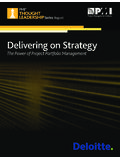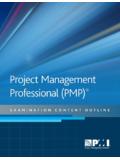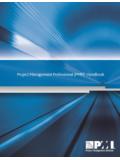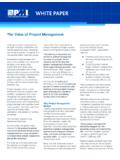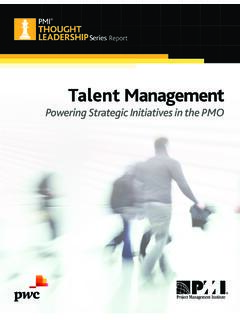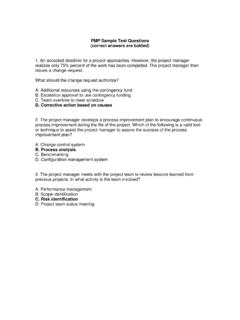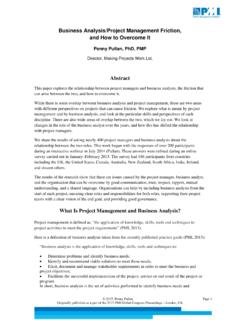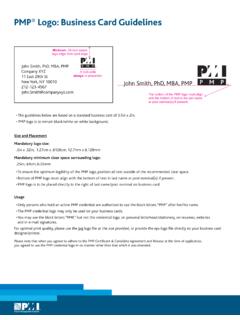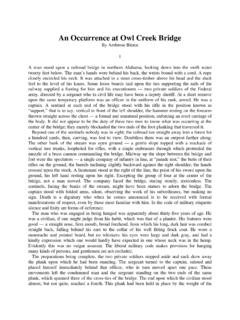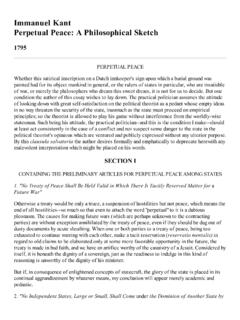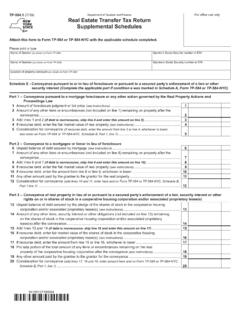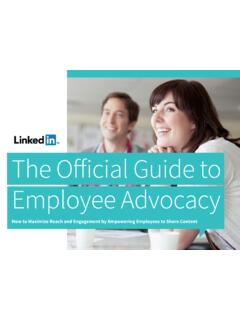Transcription of RequiRements ManageMent - Project Management Institute
1 In-Depth Report 2014. RequiRements ManageMent a Core Competency for Project And Program Success PMI's Pulse of the Profession: RequiRements ManageMent A Core Competency for Project and Program Success August 2014. INTRODUCTION. When counting the number of causes of Project failure, you need more than one hand. But the leading culprits will always include scope creep, poor communication, lack of stakeholder involvement and inadequate support from the executive sponsor. And all of these problems share something in common: they involve or impact RequiRements the process of identifying, defining, documenting and managing the solution a successful Project must deliver. Despite the obvious importance of RequiRements to Project value and business outcomes, there is a shortage of meaningful research on how organizations perceive and approach this critical component of projects and programs. This Pulse of the Profession In-Depth Report addresses that void.
2 Based on a comprehensive survey of more than 2,000 practitioners, this report provides a timely and unprecedented look into the current practice of RequiRements ManageMent and its impact on projects and programs, including exclusive data, analyses and related insights on key issues and questions. Specifically: The critical resources required;. The training and support organizations need to provide;. The processes and good practices to be followed; and Most importantly, what high-performing organizations do better or differently This report details the findings from an in-depth research Project that PMI conducted in May of 2014. The research was conducted to better understand more about the critical competency of defining and managing RequiRements in organizations, and how that capability contributes to Project and program success. PMI defines RequiRements ManageMent as the discipline of planning, monitoring, analyzing, communicating and controlling RequiRements .
3 It is a continuous process throughout a Project . It involves communication among Project team members and stakeholders and adjustments to RequiRements changes throughout the course of the Project . PMI hears from stakeholders that there is sometimes confusion between business analysis and RequiRements ManageMent . Our research provides some clarity: for organizations to deliver projects successfully, they need to be really good at business analysis. And to be really good at business analysis, they should have expertise in managing RequiRements . 2 2014 Project ManageMent Institute , Inc. PMI's Pulse of the Profession: RequiRements ManageMent A Core Competency for Project and Program Success August 2014. PMI defines business analysis as the application of knowledge, skills, tools and techniques to determine problems and identify business needs; to identify and recommend viable solutions for meeting those needs; to elicit, document, and manage stakeholder RequiRements in order to meet business and Project objectives; and to facilitate the Project team with the successful implementation of the product, service or end result of the Project or program.
4 While managing RequiRements is one critical part of the larger business analysis function, the process of business analysis often begins before Project initiation, and extends beyond Project closure, to ensure that expected benefits are realized. Regardless of whether a Project manager or business analyst has responsibility, being good at these related functions is essential to ensure successful delivery of projects and programs. But perhaps most importantly, our study finds that regardless of what it is called, or who does it, organizations are falling short in three critical areas, and projects are suffering as a result. This report highlights the importance of a sustained focus on people, process and culture to address the #2 most commonly-cited reason projects fail poor RequiRements ManageMent . Read on to find out how your organization can improve today. David P. Bieg Program Manager, Project ManageMent Institute 2014 Project ManageMent Institute , Inc.
5 3. PMI's Pulse of the Profession: RequiRements ManageMent A Core Competency for Project and Program Success August 2014. EXECUTIVE SUMMARY. It seems straightforward, but the real-world practice of RequiRements ManageMent continues to vex organizations, both small and large, for many reasons. And doing it poorly leads to Project failure. In 2009, IAG Consulting conducted a Business Analysis Benchmark survey that classified 74 percent of companies as having a low level of RequiRements ManageMent maturity, resulting in missed deadlines, budget overruns and wasted resources. These companies achieved their business objectives a mere 54 percent of the time, while taking 35 percent longer to deliver these disappointing Such findings should have served as a wake-up call. However, little has been done in the intervening years to examine how organizations are responding to the RequiRements crisis until now. PMI's 2014 annual global Pulse of the Profession study revealed that inaccurate RequiRements gathering.
6 Remained a primary cause of Project failure (37 percent) in 2014 (up from 32 percent in 2013).2 This fact, plus PMI's focus on this practice area, led us to research this cause of failure in depth and publish our findings in this report. Our study shows that far too many organizations still lack maturity in RequiRements ManageMent . They lack the necessary resources to do it properly. They are failing to develop the relevant skills in the people they do have. And, not surprisingly, executive ManageMent and sponsors are not fully valuing the importance of excellence in RequiRements ManageMent . It's costing them. For every dollar spent on projects and programs, percent is wasted due to poor RequiRements ManageMent .* Put in more striking terms, this amounts to US$51 million wasted for every US$1. billion spent. That's a lot of potential value falling through the cracks in the Project -driven world. To turn the tide and enable more successful projects and business outcomes, this study finds that organizations must focus much more attention on three critical areas that can greatly improve the effectiveness of their RequiRements ManageMent capabilities: people, processes and culture.
7 People Organizations must put the necessary resources in place to properly apply RequiRements ManageMent for recommending solutions for projects and programs. At the same time, they must also recognize and develop the skills needed to perform these functions. Processes Organizations must standardize and formalize their processes at the Project and program levels, to ensure they are consistently applying good RequiRements ManageMent practices for all their initiatives. Culture Organizations must create a sense of urgency at the top, so that executive ManageMent and sponsors fully value the practice as a critical competency of projects and programs, and provide the appropriate support and commitment needed to excel throughout the organization. * For the purposes of this report, RequiRements ManageMent is used in the broad sense, representing all of the roles that perform business analysis and RequiRements ManageMent tasks on projects and programs.
8 4 2014 Project ManageMent Institute , Inc. PMI's Pulse of the Profession: RequiRements ManageMent A Core Competency for Project and Program Success August 2014. 47%. THE URGENCY: POOR RequiRements = POOR. PERFORMANCE. There are many reasons today's organizations continue to struggle to bring consistency to their projects and programs. Despite the efforts of talented, hard-working teams, they aren't achieving the full potential of their most of unsuccessful projects fail important strategic initiatives. And in an increasingly complex business to meet goals due to poor environment, with rapid technological change and globalization, Project RequiRements ManageMent . execution is only becoming more challenging. The in-depth study finds that when projects do not meet their original goals and business objectives, inaccurate RequiRements ManageMent is the primary cause of that outcome almost half of the time (47 percent).
9 And when they identify inadequate or poor communication as a primary cause of Project failure, three out of four organizations report that the issue negatively affects RequiRements ManageMent (75 percent) more than any other area of their projects, including risk, stakeholders, schedule or budget. There are many components to successful Project implementation all of them interrelated and important but clearly RequiRements ManageMent is one of the most critical. And when it is done poorly, the consequences can be severe. The cause and effect of poor RequiRements ManageMent is worse for low-performing organizations,3 where more than half of projects are unsuccessful primarily due to poor ManageMent of RequiRements . This problem costs low performers nearly 10 cents for every dollar spent. By comparison, in high-performing organizations,4 only 11 percent of projects don't meet their original goals primarily due to poor RequiRements ManageMent , and the waste is a much more bearable 1 percent.
10 2014 Project ManageMent Institute , Inc. 5. PMI's Pulse of the Profession: RequiRements ManageMent A Core Competency for Project and Program Success August 2014. THE SITUATION: ORGANIZATIONS ARE STRUGGLING. Identifying the connections among poor RequiRements ManageMent , Project failure and wasted Project dollars is an important first step in addressing the problem. But the problem is multi-faceted our study finds that organizations lack focus on people, processes and culture. First, only half of organizations (49 percent) report that they have the necessary resources in place to properly perform RequiRements ManageMent , leaving the other half of organizations lacking resources (Figure 1). One half of organizations report not having adequate resources to do RequiRements ManageMent properly 49% 51%. 13% 36% 32% 17% 2%. Completely Mostly Somewhat Minimally Not at all Figure 1. Additionally, the study shows that there is limited recognition of the needed skills for RequiRements ManageMent ; specifically, fewer than one in four organizations (24 percent) report doing well in recognizing and developing skills needed for effective ManageMent of RequiRements .
